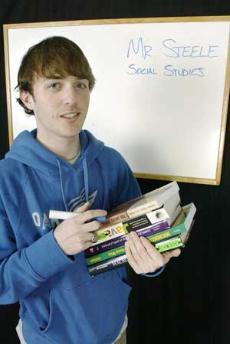
He knows the end is near.
Finishing final projects and studying for those last few exams, he realizes he will never have to take a test again. No more English papers. No more historical facts to memorize. No more tedious pop quizzes. The days of slaving over foreign languages and natural sciences are over.
He will never have to chase down a Wolfline bus in the pouring rain again. He can finally say goodbye to the Fountain food taste that has lingered in his mouth for the past four years.
But as he looks toward his future, a wave of concerns and thoughts clouds his mind.
Where will I live? Where will I work? Will I like my coworkers? Will I still be able to play video games till 4 a.m. every morning? Can I still get by with washing one load of clothes every two months?
Adam Steele, a senior in political science, said after graduation he hopes to get a teaching job in Wake County. Steele, who is engaged to marry his girlfriend of two years on Dec. 16, said he is ready for a steady job. But said his worries are mounting now that graduation is so close.
“Right now I don’t have any one set job,” he said. “So figuring out my job situation is stressful.”
However, finding a job worked out for Jeff Langston, a senior in industrial engineering. He said he has been preparing for graduation ever since his internship with Bosch in the spring.
“The biggest fear is wondering if you were going to find the right job after graduation,” he said. “Fortunately all that worked out pretty well for me.”
Langston, who is moving to Columbia, S.C., in January, will be working for Michelin. He said his supervisor at Bosch also offered him a job with the company.
“They definitely upped the pay,” he said. “They even offered me a sign-on bonus, something they don’t normally do. They were trying really hard to get me to come back.”
Langston said his internship helped him finish college and find a job. He said working a 9-to-5 job for a few months prepared him for the technical aspects of a career in industrial engineering.
It will be an “easy transition” financially, according to Langston. Having funded college on his own, Langston said he is ready to take on other bills.
“I worked and I paid for school myself,” he said. “I’m coming out virtually debt-free. I wanted to do as much as I could. There were months when I came up a little short and my parents would help me pay rent, but for the most part I paid for all of it.”
However, his transition won’t be completely debt-free.
“I’ve been driving an old car,” Langston said. “I want to buy a new car after graduation. So there will definitely be a car payment coming up here shortly. Other than that, I will have a more expensive rent payment.”
According to Steele, he is ready to take on the responsibility of a husband, earning a living to provide for his family.
“I would have said two years ago, there would have been no way that I was ready,” he said. “But after my sophomore year I realized that it was time to get serious and go to classes more.”
Being prepared for the working world isn’t the only thing concerning future graduates. They are uncertain about their postgraduation social lives.
Knowing he is leaving friends in Raleigh and heading to a new city, Langston said he is unsure how the first few months in Columbia will go without knowing anyone.
“You go down there with no friends,” Langston said. “How long are you going to be hanging out alone in your apartment before you’re able to find some people to hang out with? I’ve created a life out here for the last four years, and it’s something I’m having to leave behind and start over.”
Steele said he is going to miss his friends, as well. He said since he is transitioning into marriage and a career, he will miss some of the perks of being a college student, such as walking to class or seeing friends on a daily basis.
“I’ll miss the whole college atmosphere,” Steele said. “I’ve looked forward to coming here my whole life, and now it is almost over.”
Some advice Steele gives is to prepare for a job at least two months before graduation and allow time to spend alone and with friends.
“I’ve planned it out so that my last two semesters of my senior year, I had 12 or 13 credit hours,” Steele said. “You don’t want your senior year to have all of your hard classes.”